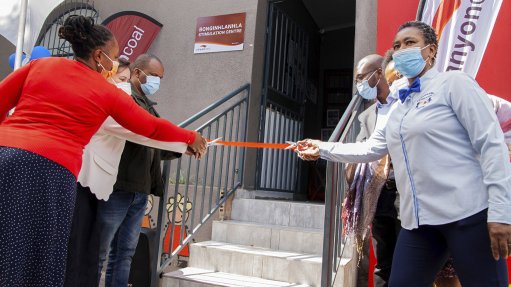
BONGINHLANHLA STIMULATION CENTRE The centre provides integrated educational programmes and services that facilitate the wellbeing and socioeconomic empowerment of learners with disabilities
Investment company Menar subsidiary Canyon Coal has a longstanding history of ensuring social and economic development to empower local communities, says Menar social labour plan manager Nthabiseng Mueti.
Canyon Coal is helping to ensure that the nongovernmental organisation Bonginhlanhla Stimulation Centre, which caters for young people with special needs, is well equipped.
The centre provides integrated educational programmes and services that facilitate the wellbeing and socioeconomic empowerment of learners with disabilities while promoting their integration into society by building capacity and self-reliance, explains Mueti.
The centre can cater for up to 50 learners who live in and around the Middelburg region, in Mpumalanga, the majority of whom are from disadvantaged families. The centre also offers learners integrated development to provide care and protection.
Mueti adds that the age of the learners who use the centre ranges from three to 18 years, with a new section having been established for older learners aged 18 to 35 years.
Canyon Coal began its journey of assisting the Bonginhlanhla Stimulation Centre in 2015, when the centre still operated at the Middelburg Care Village. At the time, Canyon Coal refurbished the facility and made substantial donations of equipment to ensure that it could cater for the learners’ special needs, she explains.
However, shortly after the handover, the centre had to move out of the Middelburg Care Village and approached Canyon Coal for further assistance.
“Canyon Coal assisted by buying and facilitating the transfer and registration of a new property for Bonginhlanhla – a site that was previously operating as a preschool.”
The centre moved into the R1.5-million facility in January 2020. The facility comprises classrooms, a kitchen, offices and toilets, as well as indoor and outdoor play areas, all of which were upgraded to make them suitable for the special needs of the learners.
The official handover only took place on April 22, 2021, owing to the delays caused by the Covid-19 lockdown restrictions, says Mueti.
Meanwhile, Bonginhlanhla Stimulation Centre manager Lindiwe Nkosi says there is value in providing a permanent home for the centre.
She explains that, “for the first time, our centre will have a facility that we own, as we previously rented premises. To own a property is very important, as it enables us to plan for the future, without having to worry about whether we will have to move every few years. It is also unsettling for our vulnerable learners, who struggle to adapt to new environments and places, to keep moving from one premise to another”.
She adds that the new premise is larger than the previous ones, which allows for sufficient classroom space and enables the centre to offer additional care and therapeutics to learners.
The Bonginhlanhla Stimulation Centre is one of several of Canyon Coal’s social and economic development drives.
Canyon Coal’s Phalanndwa Colliery, in Delmas, Mpumalanga, opened a canteen, under the catering company Khethowakho Trading and Projects, in March 2021,as part of the miner’s drive to empower local businesses, particularly women-owned businesses.
Canyon Coal procurement manager Carmia Pretorius says Khethowakho Trading and Projects, which has been in operation for several years, is an established, small catering company that operates the canteen at the colliery.
The canteen employs four people from the local community and provides a stable source of income for Khethowakho Trading and Projects, with Canyon Coal providing additional mentorship and business support in the form of financial and procurement advice along with logistical and technical support.
Canyon Coal is committed to supporting the local businesses in the communities in which it operates by including them in its procurement supply chain. “We have initiated a process to collate profiles of all our black-owned service providers to showcase them, with the hope that they will expand their businesses,” concludes Pretorius.